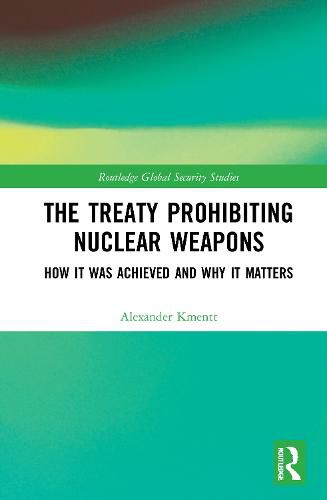Readings Newsletter
Become a Readings Member to make your shopping experience even easier.
Sign in or sign up for free!
You’re not far away from qualifying for FREE standard shipping within Australia
You’ve qualified for FREE standard shipping within Australia
The cart is loading…






This book chronicles the genesis of the negotiations that led to the Treaty on the Prohibition of Nuclear Weapons (TPNW), which challenged the established nuclear order.
The work provides readers with an authoritative account of the complex evolution of the ‘Humanitarian Initiative’ (HI) and the negotiation history of the TPNW. It includes a close analysis of internal strategy documents and communications in the author’s possession which trace the tactical and political decisions of a small group of state actors. By demonstrating the unacceptable humanitarian consequences and uncontrollable risks that these weapons pose to everyone’s security, the HI convinced many states to ban nuclear weapons and reject the policy of nuclear deterrence as unsustainable and illegitimate. As such, this book is a case-study of multilateral diplomacy and cooperation between state and civil society actors. It also contains a full discussion of both sides of the nuclear argument and assesses the extent to which the HI and the TPNW have moved the dial and present opportunities for transformational change.
This book will be of much interest to students of nuclear disarmament, arms control and non-proliferation, diplomacy, global governance, and International Relations in general.
$9.00 standard shipping within Australia
FREE standard shipping within Australia for orders over $100.00
Express & International shipping calculated at checkout
This book chronicles the genesis of the negotiations that led to the Treaty on the Prohibition of Nuclear Weapons (TPNW), which challenged the established nuclear order.
The work provides readers with an authoritative account of the complex evolution of the ‘Humanitarian Initiative’ (HI) and the negotiation history of the TPNW. It includes a close analysis of internal strategy documents and communications in the author’s possession which trace the tactical and political decisions of a small group of state actors. By demonstrating the unacceptable humanitarian consequences and uncontrollable risks that these weapons pose to everyone’s security, the HI convinced many states to ban nuclear weapons and reject the policy of nuclear deterrence as unsustainable and illegitimate. As such, this book is a case-study of multilateral diplomacy and cooperation between state and civil society actors. It also contains a full discussion of both sides of the nuclear argument and assesses the extent to which the HI and the TPNW have moved the dial and present opportunities for transformational change.
This book will be of much interest to students of nuclear disarmament, arms control and non-proliferation, diplomacy, global governance, and International Relations in general.